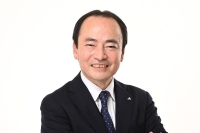OAT Agrio Co. Ltd. produces environmentally friendly fertilizers and other agricultural chemicals for the sake of both better food security and nature. In a recent interview with The Japan Times, the company’s president, Hisashi Oka, talked about its hands-on efforts to learn more and continue improving its products and services.
The company signed a partnership agreement with the town of Shintomi in Miyazaki Prefecture to promote and develop local agriculture in 2022, and started operations at an experimental farm in 2023.
One of the projects grows strawberries using Agrio Ichigo Master, a comprehensive service that includes cultivation technology and essential materials such as fertilizers and agrochemicals. “Strawberries are prone to diseases and pests, which generally results in increased use of agrochemicals,” Oka pointed out. OAT Agrio’s solution not only reduces agrochemicals and replaces them with safer or more natural ones, but also supports new farmers through harnessing artificial intelligence to evaluate plants’ conditions.
Another project focuses on demonstrating “probioponics,” which uses microorganism-based organic fertilizers in a hydroponic cultivation system. Fertilizers are supplied in precise amounts through drip tubes only when needed. “This has led to 20% to 30% less use of fertilizers,” Oka said. The Ministry of Agriculture, Forestry and Fisheries launched its Strategy Midori for a sustainable food system in 2021, aiming to reduce chemical fertilizers by 30% and increase the proportion of organic farming to 25%.
While no one doubts the need for promoting sustainable agriculture, food security is also becoming a pressing issue in the international community. OAT Agrio is committed to developing technologies that address both issues at the same time.
Oka explained that the challenge of organic fertilizers lies in controlling their ingredients, unlike chemical fertilizers whose ingredients are homogenized and guaranteed. “On the other hand, more than 90% of ingredients for chemical fertilizers are imported,” he said, meaning that shortages due to unexpected events like the COVID-19 pandemic and the Russian invasion of Ukraine can occur at any time.
OAT Agrio continues to particularly direct its research and development capabilities toward pest control using environmentally and human-friendly materials derived from natural substances. For example, Suffoil, which controls mites and is widely used for mandarin orange and tomato production, is made mainly of safflower oil. The fungicide Kaligreen is certified as organic under the Japanese Agricultural Standards (JAS). “It is used quite extensively in North and South American countries to control mildew on wheat and vegetables,” Oka said.
Another product category that the company is strong in is biostimulants, which help reduce stresses on crops from environmental changes and herbicides and accelerate growth. “The damage crops suffer from extreme weather and climate change is immense. How to mitigate this is a significant challenge in achieving sustainable food production,” Oka said. The company presented its research findings about auxins, a type of hormone in plants, at the Biostimulants World Congress in Florida in 2021. “The research showed that when a specific gene in a crop is stimulated, the hormone is activated, facilitating faster and stronger growth,” Oka said. One of the company’s products that uses this effect, Atonik, has already been registered and is being sold in 55 countries.
Many of OAT Agrio’s products are widely used around the world. The company and its 20-plus affiliates worldwide sold its products in 94 countries in 2022. “About 70% of the total sales come from overseas, and more than 65% of our employees are foreigners,” Oka said. He believes that a respect for the uniqueness of each affiliated company is necessary because each region has a different environment, requiring different agricultural techniques. OAT Agrio encourages collaboration between companies to share know-how and grow together.
OAT Agrio has also been building relationships with individual consumers by sharing its abundant knowledge of farming and horticulture as well as developing and selling retail products. On Instagram, it shares tips for growing plants and answers questions from consumers, and has gained about 50,000 followers. Oka believes it is the company’s mission to encourage consumers to experience cultivation. “I grow vegetables such as tomatoes, eggplants, cucumbers and green peppers every year. Many of our employees do too,” he said. Such hands-on experience is where new challenges are found, and this helps the company improve the technologies that are woven into new products, services and solutions for sustainable farming.




















With your current subscription plan you can comment on stories. However, before writing your first comment, please create a display name in the Profile section of your subscriber account page.